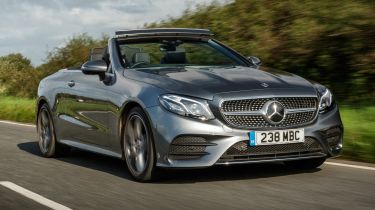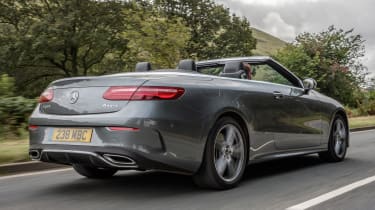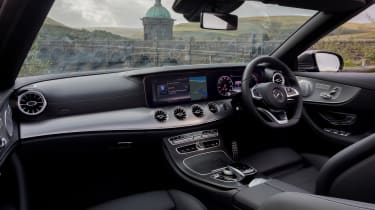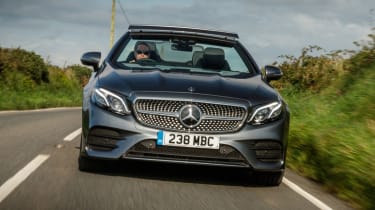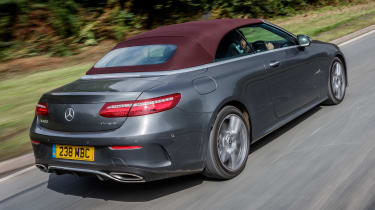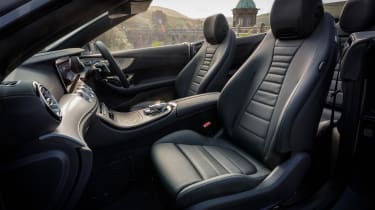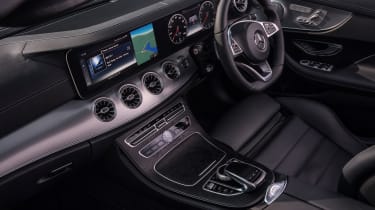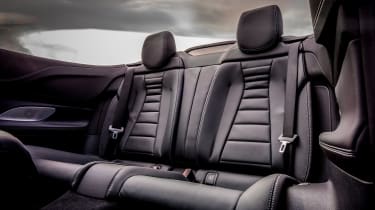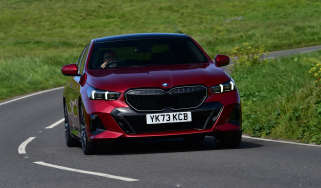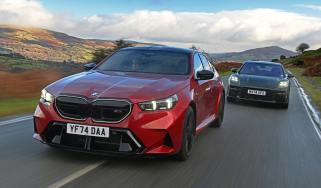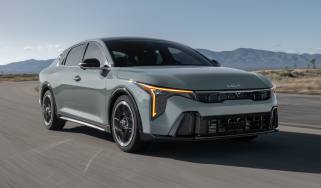Mercedes E-Class Cabriolet review
The Mercedes-Benz E-Class Cabriolet is comfortable, well-built and great to look at
Mercedes-Benz offers more convertibles in its range than any other carmaker, with the E-Class Cabriolet slotting in between the C-Class and the S-Class and just below the two-seat SL. With a starting price just shy of £45,000 – before some must-have options – it isn’t cheap, but when you think of it as a cut-price S-Class Cabriolet – which starts from an eye-watering £113,000, it makes more sense.
The E-Class Cabriolet can trace its roots back to the W124 300 CE-24 of 1991, which was rebadged E-Class in 1993. Some 33,952 units were built before production ended in 1997, before being replaced by the C-Class based CLK.
For this latest model, Mercedes has travelled full circle, with the new Cabriolet based on the E-Class platform, and not the C-Class as before. Using the C-Class wheelbase previously meant that space in the rear was restricted, especially for taller adults.
Making its debut at the 2017 Geneva Motor Show, the latest E-Class Cabriolet is longer, wider and taller than before, with enough space for four adults. With an insulated fabric roof derived from the S-Class, it’s as good with the top up as it is with the roof down, feeling every inch the ‘baby S-Class’.
For the first time, the E-Class Cabriolet can be ordered with 4Matic all-wheel drive, while a lowered ride height (down 15mm from the saloon) creates a more sporting drive. That said, the topless E-Class will always feel more at home cruising a boulevard than it would on a winding B-road.
More reviews
Car group tests
In-depth reviews
Road tests
- Mercedes E 220 d review: a technical tour de force
- New Mercedes-AMG E 53 4Matic+ review: super saloon swaps focus for all-round ability
- New Mercedes E 300 e plug-in hybrid 2023 review
Used car tests
• Best convertible cars on sale
The entry-level E 220d is likely to be the biggest seller in the UK. Powered by the firm’s new 2.0-litre diesel engine, it delivers 191bhp and 400Nm, while 4Matic can be added for an additional £1,600.
The more powerful E 350d completes the diesel line-up. With its 3.0-litre turbodiesel six-cylinder engine, there’s a mighty 254bhp and 620Nm on tap. Perhaps unsurprisingly, 4Matic is standard fit on the flagship diesel.
Petrol lovers can choose between a 2.0-litre four-cylinder E 300 and 3.0-litre six-cylinder E 400. With an engine derived from the AMG E 43, this detuned version delivers 328bhp and 480Nm of torque. A nine-speed automatic transmission is standard fit across the entire E-Class Cabriolet range.
All models leave the factory in desirable AMG Line trim, but few cars will be built without a plethora of options. Tick a few boxes and the E-Class Cabriolet’s list price will swell considerably.
Rivals are actually few and far between. While the Audi A5 Cabriolet and BMW 4 Series Convertible technically rival the smaller C-Class, many E-Class buyers will look at those cars as likely alternatives. The amount of rear space and overall quality puts it in the same arena as the more expensive (and soon-to-be-replaced) 6 Series Convertible, however.
Image is everything in the convertible segment and the Mercedes-Benz E-Class Cabriolet ticks many boxes. Feeling every inch the ‘baby S-Class Cabriolet’, the E-Class boasts an insulated fabric roof, four full-size seats and a surprisingly large boot. Avoid the more expensive six-cylinder engines and opt for the E 220d, which suits the smooth and relaxed nature of the E-Class Cabriolet. A real class act.
Engines, performance and drive
Mercedes has worked hard to inject what it calls ‘luxurious sporty character’ into the E-Class Cabriolet. But while suspension lowered by 15mm and track width up 67mm at the front and 68mm at the rear (compared with the previous model) might hint at something sporting, this remains more boulevard cruiser than B-road blaster.
The entry-level E 220d is actually the range sweet spot, offering the best blend of efficiency, dynamics and performance. The engine is impressively smooth and relaxing, and performance is respectable. It’s far from rapid but feels effortless when cruising.
With 4Matic all-wheel drive, the E-Class Cabriolet tips the scales at more than 1,900kg, so even if the six-cylinder versions are reasonably swift off the line, they’re not out-and-out sports cars. The handling is composed enough, but the Cabriolet is hardly light on its feet.
Merc’s Dynamic Select system is standard across the range, providing access to a choice of driving modes, but our advice would be to stick the car in Comfort and enjoy the impressively plush and refined ride. Just avoid the 20-inch wheels, which can thump over our imperfect roads.
Air suspension – standard on the six-cylinder versions and optional on the others – does take the ride quality up another notch, but it’s expensive and we’d think twice before ticking the option box. Instead, sit back and enjoy the comfort-tuned standard suspension.
Engines
There are four engines to choose from: two petrols and two diesels. The entry-level E 220d develops 191bhp and 400Nm of torque to deliver a 0-62mph time of 7.7 seconds and a top speed of 147mph. The 4Matic setup adds 0.2 seconds to the 0-62mph time and 2mph to the top speed.
The six-cylinder E 350d delivers 254bhp and 620Nm of torque, taking the 0-62mph time down to 6.1 seconds, while top speed is limited to 155mph.
The E 300 is powered by a four-cylinder petrol engine and can hit 62mph in 6.6 seconds. The flagship six-cylinder E 400 delivers 328bhp and 420Nm to provide a best-in-range 0-62mph time of 5.5 seconds and a top speed limited to 155mph. Hybrid-powered AMG E 53 versions are expected to arrive later.
In truth, the E 220d is the pick of the bunch for now. And if the act of selecting a four-cylinder diesel engine as the top choice seems sacrilegious in this post ‘dieselgate’ world, so be it. The fact is: it’s the engine best suited to the E-Class Cabriolet’s smooth and relaxed nature.
The E 350d, while undoubtedly smooth and blessed with that added torque, is hampered by the additional weight, which blunts the performance and increases fuel consumption. It will also cost more to tax and insure.
Meanwhile, the E 400 is far from being the topless AMG wannabe you’d hope it would be. The performance is best described as brisk, while the overall levels of refinement remove any sense of speed. It’ll also cost a considerable amount more to run than the entry-level cars.
MPG, CO2 and Running Costs
Unsurprisingly, the E 220d is the most efficient engine, offering a claimed 57.7mpg in standard guise and 49.6mpg when mated to the brand’s 4Matic all-wheel drive. At 41.5mpg, the E 350d is only marginally more efficient than the E 300 petrol, thanks to the additional weight and standard-fit all-wheel drive. The E 400 is the least efficient, at 32.8mpg.
With CO2 emissions of 126g/km, the E 220d is the cheapest to tax at £160 for the first year, with 4Matic adding 20kg and an extra £40 in tax. The other models are far more expensive to tax: the E 300’s 167g/km equates to £500, the E 350d £800, and the E 400 £1,200.
In all cases, the E-Class Cabriolet is subject to the £310 surcharge for cars costing more than £40,000, equating to a cost of £450 every year from year two.
Insurance groups
The E 220d should be the cheapest to insure, with a group rating of 40, although ticking the box marked ‘Premium Plus’ raises the premium by one level. The E350 d is likely to be the most expensive to insure (group 45), while the E 400 isn’t far behind (group 44).
Depreciation
The E-Class saloon is expected to hold onto 45 per cent of its value, and we would expect the Cabriolet to follow suit. The fact that it’s a genuine four-seater and all models are equipped with the desirable AMG Line trim will help its cause.
Other factors that will influence the residual values include must-have options, the right colour, leather upholstery and 20-inch alloy wheels. Image is everything in this segment - so be careful when selecting one of the colourful roof options.
Interior, design and technology
Going topless has never looked so good. With styling clearly influenced by the S-Class Cabriolet, thanks to its more compact proportions, the E-Class Cabriolet manages to upstage its larger and more expensive sibling.
The S-Class derived insulated fabric roof – available in four colours – lends a classic feel to the Cabriolet while providing the theatre of opening or closing in just 20 seconds. The front end is imposing, without appearing aggressive, while you’d be hard-pressed to tell it apart from the S-Class from behind – especially if you remove the badges.
Only the ‘Aircap’ deflector lets the side down. The automatic draught-stop system comprises a wind deflector in the roof frame and a draught excluder behind the rear seats to reduce turbulence for all passengers. In our experience, it only serves to increase wind noise at speed and is less effective than on the C-Class Cabriolet.
On the flipside, the Airscarf neck-level heating system for the driver and passenger remains a great addition, and a must-have feature in the often damp and miserable UK. Roof up or roof down, you can have a conversation at motorway speeds in the E-Class Cabrio, meaning you might even begin to question the relevance of the Coupe.
But if the outside is desirable, the inside is spectacular. The quality and details are exquisite, with top-notch materials and a plethora of neat features. Again, the cabin is inspired by the S-Class, with a minimalist dashboard flanked by a pair of air outlets inspired by jet engines. There are a further three, smaller air outlets in the centre of the ‘floating’ dashboard.
In the back, passengers are treated to a pair of individually sculpted seats, a pair of cup holders and two more beautifully engineered air vents. While some cabriolets might leave rear seat passengers feeling shortchanged, in the E-Class they’re part of the theatre.
Overall, the interior of the E-Class Cabriolet feels closer to the S-Class than it does the C-Class. A masterclass in fit, finish and ambience.
Sat-nav, stereo and infotainment
The E 220d and E 300 feature Mercedes’ standard 8.4-inch screen set in the centre of the dashboard, while the E 350d and E 400 boast the impressive 12.3-inch media display. This setup is optional on the lesser models.
Similarly, the six-cylinder versions feature the impressive Comand Online system, comprising a 12.3-inch digital instrument cluster, which blends seamlessly with the central display a single piece of glass to create a high-tech feel. Again, the upgraded screen is available as an option on the four-cylinder models.
Audio fans will be tempted to tick the box marked ‘Premium Plus’, which includes a Burmester surround sound system. At £2,895, it’s not a cheap option, but the 13-speaker and 590-watt system is one of the best in the business.
Practicality, comfort and boot space
The E-Class Cabriolet is surprisingly practical, helped in no small part by the fabric roof, which leaves room for storage, even with the roof down. The only real criticism concerns the rather upright rear seats, which might be uncomfortable on a long trip.
If the rear seats aren’t required, and you’re planning an extended holiday or trip to the DIY store, the 50:50 folding backrests create a through-loading feature. There’s also plenty of storage in the cabin, with a large glovebox, a lidded compartment in the centre console and deep door pockets.
Size
The E-Class Cabriolet has grown compared to its predecessor, with an overall length of 4,826mm, up 123mm from before. Width is up 74mm to 1,860mm, height up 30mm to 1,428mm, and the wheelbase up 113mm to 2,873mm.
All very good from a practicality perspective – you just need to ensure the new E-Class Cabriolet will fit in your garage or on your driveway. It feels like quite a big car on the road, too.
Leg room, head room & passenger space
The increase in size is great news for rear seat passengers, with the amount of rear legroom up from 764mm to 866m. The fact that all four passengers have individual seats only serves to increase the feeling of space.
Head, shoulder and elbow-room are also increased, most notably in the front, but also in the rear. Again, this enhances the sense that you’re in a baby S-Class Cabriolet, rather than a standalone model.
Boot
The boot might be shallow, but 385 litres provides a reasonable amount of luggage space. This drops to 310 litres with the roof down, meaning you won’t need to leave much behind if you intend to go topless.
Despite sitting in the class below, the Audi A5 Cabriolet offers an impressive 380 litres with the roof up and 320 litres with the roof down, while the S-Class Cabriolets offers a relatively miserly 400 litres considering the price bump.
Reliability and Safety
Safety is an E-Class Cabriolet strong point, with active brake assist, parking assist, attention assist, a child seat recognition sensor and roll-over protection all standard across the range.
The Driving Assistance package improves things further, adding a blind spot monitor, brake assist, adaptive cruise control, lane departure warning, evasive steering assist and Pre-Safe Plus, which takes preventive measures to protect the occupants in the event of a crash.
The E-Class Cabriolet is unlikely to be crash tested by Euro NCAP, but owners should be encouraged by the five-star rating awarded to the saloon version in 2016.
The Mercedes E-Class finished eighth in our 2017 Driver Power survey, scoring an impressive 92.56% for reliability. Sadly, Mercedes could only finish 21st in the brand survey, while its dealers were unable to make the top 10.
Warranty
All Mercedes models come with a three-year unlimited mileage warranty and up to 30 years European breakdown assistance. That’s par for the course and better than Audi, which limits its customers to 60,000 miles worth of coverage.
Servicing
The E-Class Cabriolet needs servicing every 15,500 miles or 12 months, whichever comes soonest. A three-year service package is available for £37 per month, which works out at £1,332 overall.
